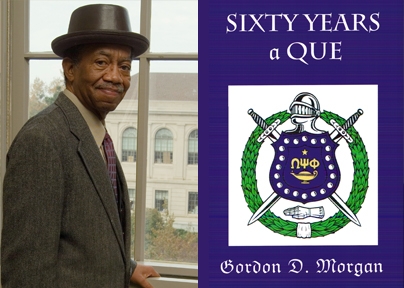Greek System Praised in Book by Sociology Professor
FAYETTEVILLE, Ark. – Gordon D. Morgan, a University Professor of sociology who has taught at the University of Arkansas since 1973, has released a new book, ‘Sixty Years a Que’: Greek Letter Societies and the African American Community ($22.00, New Academia Publishing). The book is a memoir dedicated to the many young people who are curious about what black “Greekdom” was about more than half a century ago.
Morgan attended what is now the University of Arkansas at Pine Bluff, a historically black college, in 1949. When he arrived on campus he had little knowledge about the Greek system of fraternities and sororities. His brother, a year ahead of him, was a fraternity member and Morgan noticed the activities he was engaged in, and how much he enjoyed them. Morgan was a choir member, and saw Greeks participating and leading multiple organizations. He kept his grade point average up, and was eligible to apply for membership by writing a letter to the Omegas Psi Phi explaining why he wanted to be a “Que,” a popular nickname for members of the Omega Psi Phi fraternity.
“I was initiated in 1950. One thing I noticed was that when I became Greek, my own status went up on the campus. I became far more popular than I would have been had I not become Greek,” Morgan said. “I was expected to seek and perform in development roles. I completed my collegiate career as vice president of the student government, an attainment that was helped by the Greek system.”
Originally, Morgan did not plan to publish ‘Sixty Years a Que’ when he started writing it years ago. However, he wanted to share his experiences with many people, so he put together a fun, “light read” to provide information on his experience with the Greek system and share the positive influence it had on his life. He said he hopes readers will look back and remember their own good times and experiences within the Greek system.
“The Greek system stressed scholarship, not just the attainment of grades, but the development of independent minds,” Morgan said. “When I look at the overall Greek program, I am convinced that it stressed better citizenship.” He strongly believes participating in Greek life helped him develop as a person.
Morgan said students should “remember that the collegiate experience is something that will remain one of their most important experiences.” He believes students will discover unknown talents as they also encounter various people with different life experiences.
Morgan dedicated this book to students. “My hope is that students will become encouraged to get more out of college than certificates and letter grades.”
Morgan graduated cum laude as a Que, with a bachelor’s degree in sociology. He went on to earn a master’s degree at the University of Arkansas in 1956 and a doctoral degree from Washington State University in Pullman in 1963. Morgan earned a commission as second lieutenant in the U.S. Army artillery in 1959. He served as a distinguished visiting professor at Washington State University in Pullman and has been a consultant for Philander Smith College in Little Rock, the Arkansas Program on Basic Adult Education and the National Institutes of Mental Health in Washington, D.C. He also received fellowships from the Ford Foundation, the Russell Sage Foundation, the American College Testing Program and from the National Endowment for the Humanities.
Morgan’s writings have spanned many aspects of the African American and diasporian experience. His work and research have taken him across the world to the Far East, Africa, the Caribbean and Europe.
Contacts
Lauren Treat, intern
University Relations
479-575-5555, lxt007@uark.edu
